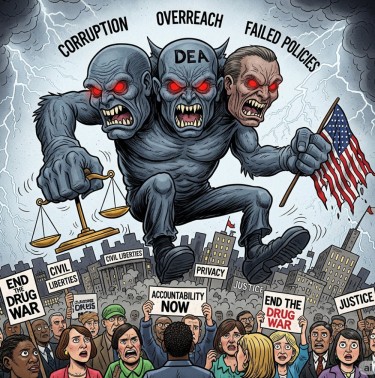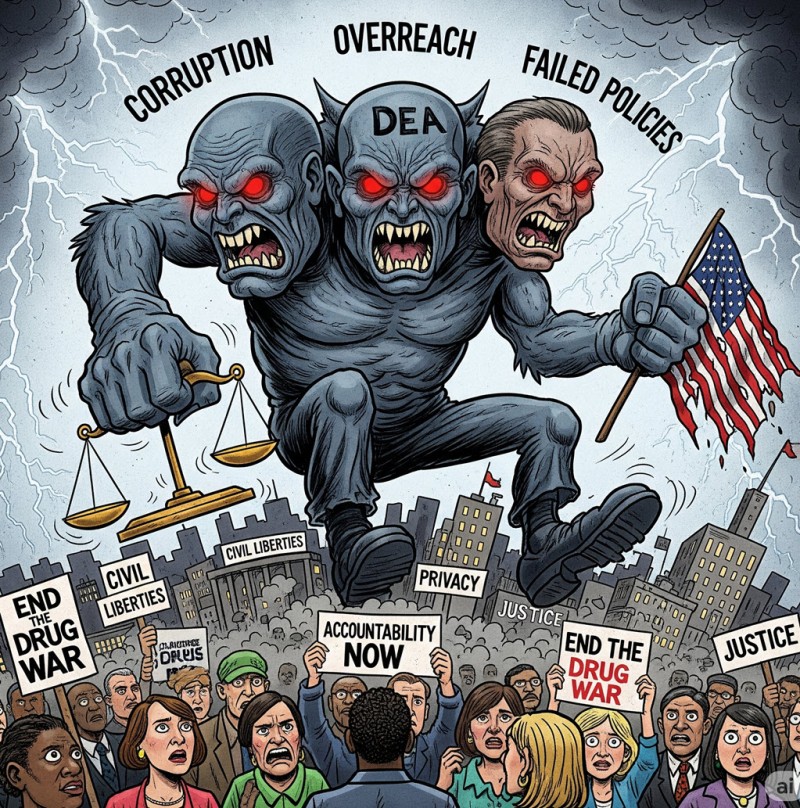
In 1971, President Nixon declared drug abuse to be "public enemy number one," launching the War on Drugs with the promise of protecting American communities from the scourge of illegal substances. Over half a century later, it's become painfully clear that Nixon got it backwards. The real public enemy isn't drug abuse - it's the Drug Enforcement Administration itself, an agency that has evolved from a misguided law enforcement effort into an actively destructive force that threatens American lives, liberty, and scientific progress.
The DEA has become a rogue agency that operates with impunity while failing at every measurable objective. They've spent over $50 billion annually terrorizing American citizens, destroying medical research, and protecting criminal cartels through policies that create artificial scarcity and eliminate legal competition. Meanwhile, drug availability has increased, overdose deaths have skyrocketed, and the agency has devolved into a propaganda machine that promotes debunked theories while suppressing life-saving medical research.
The agency's recent promotion of anti-cannabis propaganda immediately after swearing in new Administrator Terrance Cole demonstrates their commitment to ideology over evidence, politics over public health, and bureaucratic self-preservation over American welfare. When a federal agency spends taxpayer money promoting articles claiming that cannabis causes depression and suicide while blocking research into cannabis treatments for Huntington's Disease and Multiple Sclerosis, that agency has become an enemy of the people it claims to serve.
The DEA's systematic sabotage of legitimate medical research, documented perjury in federal court proceedings, and constitutional violations in their administrative processes reveal an organization that has abandoned any pretense of serving justice or public health. Instead, they've become a protection racket for pharmaceutical companies and criminal cartels, using the force of federal law to eliminate competition while enriching the very problems they claim to address.
It's time to acknowledge the obvious: the DEA is public enemy number one, and American society would be safer, healthier, and more prosperous without this destructive bureaucracy consuming billions in taxpayer funds while actively harming the people they're supposed to protect.
The Propaganda Machine: Manufacturing Fear While Suppressing Science
The DEA's latest anti-cannabis campaign reveals an agency more committed to spreading propaganda than protecting public health. Days after swearing in Administrator Terrance Cole, the agency promoted an article by Yale professor Mark Gold claiming that "Cannabis Use Increases Depressive and Suicidal Thinking" - a piece that ignores thousands of peer-reviewed studies demonstrating cannabis's therapeutic benefits while cherry-picking data to support predetermined conclusions.
This isn't legitimate public health messaging - it's taxpayer-funded misinformation designed to maintain the DEA's relevance and budget in the face of overwhelming evidence that their core mission is counterproductive. The article claims that cannabis is "largely unstudied" despite over 20,000 published studies on the plant, demonstrating either willful ignorance or deliberate deception about the state of cannabis research.
The timing is particularly telling. While the DEA promotes propaganda about cannabis causing suicide, they're simultaneously blocking legitimate research into cannabis treatments for deadly diseases like Huntington's and Multiple Sclerosis. The agency would rather spread fear about hypothetical mental health risks than allow scientists to study actual therapeutic applications that could save lives.
The DEA's promotion of Mark Gold, who has been "lauded by prohibitionists" including Smart Approaches to Marijuana (SAM), reveals the circular nature of their propaganda operation. The agency promotes "experts" who support prohibition, then cites those same experts as authorities justifying continued prohibition. It's an echo chamber designed to reinforce predetermined conclusions rather than follow scientific evidence.
This pattern extends beyond cannabis to the DEA's broader anti-drug messaging, including their bizarre emoji interpretation guides claiming that shocked face emojis represent marijuana and their advice that young people should become Instagram influencers instead of using drugs. These campaigns reveal an agency completely disconnected from reality while desperate to justify their continued existence.
The constitutional problems with DEA propaganda become clear when taxpayer-funded websites promote scientifically debunked theories like the "gateway drug" hypothesis while suppressing research that contradicts agency positions. When a law enforcement agency becomes a propaganda ministry, it has abandoned its legitimate governmental role and become a threat to democratic governance.
The ultimate irony is that states with legal cannabis markets consistently show better mental health outcomes than prohibition states, directly contradicting the DEA's fear-mongering about cannabis causing depression and suicide. The agency is promoting theories that have been disproven by real-world evidence from 24 legal states.
Scientific Sabotage: Blocking Life-Saving Research
The DEA's treatment of MMJ BioPharma Cultivation exposes the agency's systematic sabotage of legitimate medical research. For seven years, this Rhode Island company has sought federal approval to grow cannabis for FDA-approved clinical trials targeting Huntington's Disease and Multiple Sclerosis - exactly the kind of research that could provide life-saving treatments for patients with terminal conditions.
Instead of facilitating this research, the DEA has engaged in what can only be described as deliberate obstruction. Administrative Law Judge John Mulrooney II denied MMJ's bulk manufacturing registration "without a hearing, without cross-examination, and without admitting material evidence into the record." This procedural manipulation ensured that the company couldn't present evidence supporting their application.
The constitutional violations are staggering. The Supreme Court has ruled in multiple cases that agency administrative law judges violate separation of powers because they're insulated from presidential removal. The Department of Justice has declared DEA hearings like MMJ's to be "legally void," yet the agency continues operating these kangaroo courts to block legitimate research.
Most damning of all, DEA attorney Aarathi D. Haig submitted demonstrably false statements to the new DEA Administrator, claiming that MMJ "lacked a bona fide supply agreement" when the company had a properly executed agreement that satisfied every regulatory requirement. This isn't a bureaucratic mistake - it's documented perjury in federal proceedings designed to block medical research.
The supply agreement between MMJ and a DEA-registered Schedule I manufacturer contains every element required by federal regulations: specific strains and quantities, harvest notifications, packaging requirements, secure storage protocols, and clinical trial documentation. Yet DEA officials continue claiming in federal filings that MMJ "failed" to provide adequate documentation.
This represents scientific sabotage at the highest levels of federal bureaucracy. The DEA is deliberately blocking research into treatments for terminal diseases while promoting propaganda about cannabis's supposed dangers. They're protecting their institutional interests by ensuring that legitimate scientific research can't contradict their ideological positions.
The broader implications are terrifying. If the DEA can block research into Huntington's Disease and Multiple Sclerosis treatments through procedural manipulation and documented falsehoods, what other life-saving research have they suppressed? How many patients have died because the DEA prioritized bureaucratic control over medical progress?
The agency's systematic obstruction of cannabis research represents one of the greatest scandals in modern American government - a federal agency deliberately preventing medical breakthroughs that could alleviate human suffering because those breakthroughs would undermine their budget and authority.
Constitutional Violations and Criminal Conduct
The DEA's operation has become a constitutional crisis wrapped in a criminal conspiracy. The agency routinely violates Fourth Amendment protections against unreasonable search and seizure, Fifth Amendment due process requirements, and separation of powers principles that form the foundation of American governance.
The MMJ BioPharma case reveals criminal conduct at the highest levels of DEA operations. When federal attorneys submit demonstrably false statements to agency administrators, they're committing fraud on the tribunal - a serious criminal offense that could result in disbarment and federal prosecution. Yet DEA attorney Aarathi D. Haig faces no consequences for documented perjury in federal proceedings.
The agency's administrative law judge system operates as a constitutional violation factory, denying due process rights while insulating decision-makers from democratic accountability. Even after the Supreme Court declared these systems unconstitutional and the Department of Justice abandoned their defense, the DEA continues operating illegal proceedings to block legitimate research and business operations.
Civil asset forfeiture represents another area of systematic constitutional violations, where the DEA seizes property without criminal convictions and forces property owners to prove their innocence rather than requiring the government to prove guilt. This reversal of constitutional presumptions has generated billions in revenue for agencies while destroying countless innocent lives.
The agency's no-knock warrant operations regularly result in wrong-address raids, property destruction, and civilian casualties that would constitute criminal assault if committed by private individuals. Police militarization through DEA programs has transformed local law enforcement from community service organizations into occupying armies that terrorize the communities they're supposed to protect.
Surveillance programs operated by the DEA routinely violate Fourth Amendment protections by collecting communications data without warrants, creating databases of American citizens' private information, and sharing that intelligence with local law enforcement through parallel construction that conceals illegal surveillance from defense attorneys and judges.
The prosecution of medical cannabis patients and providers in legal states represents federal supremacy clause abuse that violates state sovereignty and democratic federalism. When federal agents arrest state-legal medical cannabis operators, they're undermining the constitutional balance between federal and state authority.
Perhaps most seriously, the DEA's continued prohibition enforcement in the face of overwhelming evidence of failure could constitute criminal negligence or willful indifference to public welfare. When agency officials know that their policies increase overdose deaths, empower criminal organizations, and prevent life-saving medical research, their continued enforcement could meet legal standards for criminal liability.
Economic Warfare Against Americans
The DEA's $3.1 billion annual budget represents one of the most expensive failures in government history, but the true economic damage extends far beyond direct appropriations. The agency's operations destroy productive economic activity while enriching criminal organizations and creating perverse incentives that harm American prosperity.
Prohibition enforcement eliminates legitimate businesses that could generate jobs, tax revenue, and economic development while handing those opportunities to criminal cartels that pay no taxes and follow no regulations. Every cannabis business prevented by DEA enforcement represents lost economic activity that instead enriches violent criminal organizations.
The agency's asset forfeiture operations function as legalized theft, seizing billions in property from American citizens without criminal convictions. These seizures often target small business owners, farmers, and working-class families who lack resources to challenge federal agencies in court. The DEA has literally stolen more from Americans than burglars.
Professional licensing restrictions tied to federal drug scheduling prevent qualified individuals from participating in legal cannabis industries, reducing competition and innovation while protecting established operators from market forces. These barriers to entry serve corporate interests rather than consumer welfare or public safety.
Research restrictions impose enormous opportunity costs by preventing medical breakthroughs that could save lives and reduce healthcare expenses. The DEA's blocking of cannabis research represents economic warfare against American patients who could benefit from safer, more effective treatments than expensive pharmaceutical alternatives.
Criminal justice costs multiply through DEA enforcement priorities that flood courts and prisons with non-violent drug offenders while violent criminals receive reduced attention. Mass incarceration removes productive individuals from the workforce while imposing enormous costs on taxpayers and communities.
International competitiveness suffers as other countries develop cannabis and pharmaceutical industries while American businesses face federal criminal liability for identical activities. Canada, Israel, and European nations are capturing market opportunities that American innovation could dominate if not for DEA obstruction.
The pharmaceutical protection racket operated by the DEA through scheduling manipulation costs Americans billions in healthcare expenses while protecting drug company profits from competitive pressure. Cannabis prohibition functions as a tariff on natural medicine that forces Americans to purchase expensive synthetic alternatives.
Banking restrictions tied to federal cannabis prohibition prevent legal businesses from accessing financial services, forcing them to operate in cash and creating public safety risks while limiting business development and tax compliance. These restrictions serve no public interest while imposing enormous costs on legitimate businesses.
The Cartel Protection Agency
Perhaps the DEA's greatest failure is their role as unwitting protectors of the criminal cartels they claim to fight. Prohibition creates the artificial scarcity and price supports that make drug trafficking profitable, while DEA enforcement eliminates legal competition that would destroy cartel business models.
Mexican cartels generate an estimated $13-29 billion annually from drug trafficking to the United States - revenue that exists only because prohibition eliminates legal suppliers. Every gram of cannabis, cocaine, or heroin sold by cartels represents a business opportunity that prohibition policies reserve for criminal organizations.
The DEA's strategy of arresting low-level dealers while leaving distribution networks intact ensures steady demand for cartel products while eliminating competition between criminal organizations. High-level traffickers remain largely untouched while street-level sellers face harsh sentences that do nothing to disrupt supply chains.
Synthetic drug proliferation represents the DEA's most catastrophic failure, where prohibition incentives drove innovation toward more dangerous substances that are easier to smuggle and harder to detect. Fentanyl exists as a mass-market product because prohibition made natural opiates too expensive and difficult to transport profitably.
Border enforcement theater consumes billions in resources while having no measurable impact on drug availability or prices. The DEA's interdiction efforts function as a business expense for cartels rather than a meaningful obstacle to their operations. When drug seizures are measured in tons while availability remains constant, enforcement is clearly failing.
Money laundering investigations reveal the scale of cartel financial operations while doing nothing to disrupt them. The DEA has documented how criminal organizations move billions through American financial institutions, yet these networks continue operating because prohibition ensures their profitability.
Violence associated with drug trafficking stems directly from prohibition policies that prevent legal dispute resolution and quality control. Cartels use violence because they can't access courts, law enforcement, or regulatory agencies to resolve business disputes or ensure product quality.
The DEA's international operations often involve cooperation with foreign military and law enforcement agencies that are themselves corrupt and connected to trafficking organizations. American drug war resources end up supporting the same criminal networks they're supposed to combat.
State-level legalization has demonstrated that regulated markets immediately reduce cartel profits and influence. Cannabis legalization in California eliminated an estimated $1.3 billion in annual cartel revenue, proving that legal competition destroys criminal business models more effectively than enforcement.
The Sticky Bottom Line: Abolish This Criminal Enterprise
After reviewing the DEA's record of failure, constitutional violations, criminal conduct, and economic sabotage, the conclusion is inescapable: this agency has become a greater threat to American welfare than the problems it claims to address. The DEA is not just failing at its mission - it's actively making every drug-related problem worse while consuming enormous resources that could address real public safety concerns.
The agency's systematic obstruction of life-saving medical research while promoting scientifically debunked propaganda represents a betrayal of public trust so profound that it demands immediate abolition rather than reform. When federal employees commit documented perjury to block treatments for terminal diseases, they've crossed the line from incompetence to criminal conspiracy.
The constitutional violations are so systematic and extensive that the agency cannot be reformed within existing legal frameworks. The Supreme Court has declared their administrative processes unconstitutional, the Department of Justice has abandoned their defense, yet they continue operating illegal proceedings while violating due process rights and separation of powers principles.
Economic analysis reveals that the DEA functions as a protection racket for pharmaceutical companies and criminal cartels while imposing enormous costs on American taxpayers and legitimate businesses. Society would be measurably safer and more prosperous if the $3.1 billion DEA budget were simply eliminated rather than redirected to other agencies.
International evidence from Portugal, Netherlands, Switzerland, and other countries demonstrates that public health approaches to drug policy produce better outcomes with fewer resources and less social disruption. The DEA model has been tested internationally and found to fail consistently compared to evidence-based alternatives.
State-level cannabis legalization provides definitive proof that DEA policies cause more harm than drug use itself. Legal states consistently show better outcomes in terms of youth usage, criminal activity, public safety, and public health - exactly the opposite of what DEA propaganda predicts.
The time for half-measures and reform has passed. The DEA cannot be fixed because its fundamental mission - using criminal law to eliminate consensual adult behavior - is inherently counterproductive and unconstitutional. The agency must be abolished entirely, with its functions either eliminated or transferred to agencies focused on public health rather than punishment.
Congress should immediately defund DEA operations and transfer any legitimate law enforcement functions to existing agencies that don't have institutional commitments to failed prohibition policies. The billions currently wasted on DEA operations could fund treatment, harm reduction, and medical research that would actually improve public health and safety.
New DEA Administrator Terrance Cole inherited a criminal enterprise masquerading as a law enforcement agency. His first act should be recommending Congressional abolition of the DEA rather than attempting to reform an irredeemably corrupt organization that has become America's real public enemy number one.
The DEA must be abolished. American lives, liberty, and prosperity depend on it.







